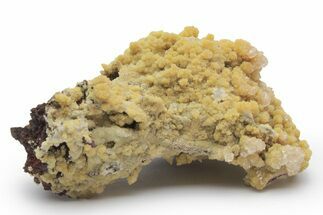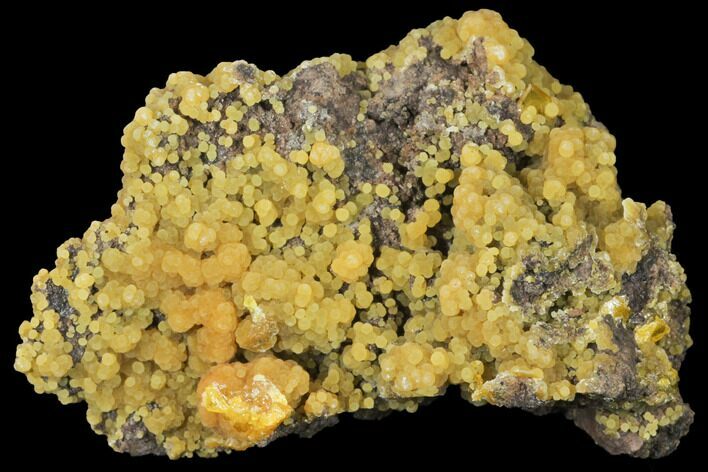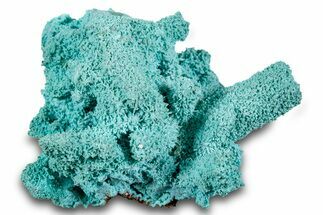This Specimen has been sold.
1.95" Wulfenite and Botryoidal Mimetite Association - Mexico
This specimen contains yellow-orange wulfenite crystals that formed in associaiton with botryoidal mimetite. This specimen was collected from the San Francisco Mine in Sonora, Mexico.
About Wulfenite
Wulfenite is a lead-based molybdate mineral with a chemical formula Pb(MoO4). It forms as a secondary mineral in the oxidation zones of hydrothermal lead deposits, its color ranging anywhere between yellow to bright orange and red and occasionally brown. Typically forming as tabular, stubby, or pyramidal crystals, this unique mineral can be both brilliantly transparent and opaque.
Safety: While these crystals are safe to hold, due to the fact that they are lead-based we strongly recommend washing your hands after handling.
Wulfenite is a lead-based molybdate mineral with a chemical formula Pb(MoO4). It forms as a secondary mineral in the oxidation zones of hydrothermal lead deposits, its color ranging anywhere between yellow to bright orange and red and occasionally brown. Typically forming as tabular, stubby, or pyramidal crystals, this unique mineral can be both brilliantly transparent and opaque.
Safety: While these crystals are safe to hold, due to the fact that they are lead-based we strongly recommend washing your hands after handling.
About Mimetite
Mimetite is a rare lead arsenate chloride mineral, often found in shades ranging from bright yellow to orange, brown, and occasionally green. Its crystals form in a hexagonal structure, typically appearing as prismatic or rounded barrel shapes, though they can also form in botryoidal or globular clusters. This mineral belongs to the apatite group and is closely related to pyromorphite and vanadinite, with which it can sometimes be found in mixed forms. Mimetite's vibrant colors and crystal formations make it a popular specimen among mineral collectors, as it is often highly aesthetic and eye-catching.
This mineral is usually found in the oxidized zones of lead ore deposits, commonly associated with minerals such as galena, wulfenite, and cerussite. It can be found in notable deposits worldwide, including locations in Mexico, Namibia, and Australia, where large and well-formed specimens have been unearthed. Mimetite crystals are relatively fragile due to their lead and arsenic content, requiring careful handling. Despite its appeal, mimetite is not used in jewelry or as a decorative stone because of its toxic elements, making it mainly a collector's mineral.
Mimetite is a rare lead arsenate chloride mineral, often found in shades ranging from bright yellow to orange, brown, and occasionally green. Its crystals form in a hexagonal structure, typically appearing as prismatic or rounded barrel shapes, though they can also form in botryoidal or globular clusters. This mineral belongs to the apatite group and is closely related to pyromorphite and vanadinite, with which it can sometimes be found in mixed forms. Mimetite's vibrant colors and crystal formations make it a popular specimen among mineral collectors, as it is often highly aesthetic and eye-catching.
This mineral is usually found in the oxidized zones of lead ore deposits, commonly associated with minerals such as galena, wulfenite, and cerussite. It can be found in notable deposits worldwide, including locations in Mexico, Namibia, and Australia, where large and well-formed specimens have been unearthed. Mimetite crystals are relatively fragile due to their lead and arsenic content, requiring careful handling. Despite its appeal, mimetite is not used in jewelry or as a decorative stone because of its toxic elements, making it mainly a collector's mineral.
SPECIES
Wulfenite & Mimetite
LOCATION
San Francisco Mine, Cerro Prieto, Cucurpe, Sonora, Mexico
SIZE
1.95" wide matrix. Largest wulfenite crystal is .12"
CATEGORY
ITEM
#127400
 Reviews
Reviews














